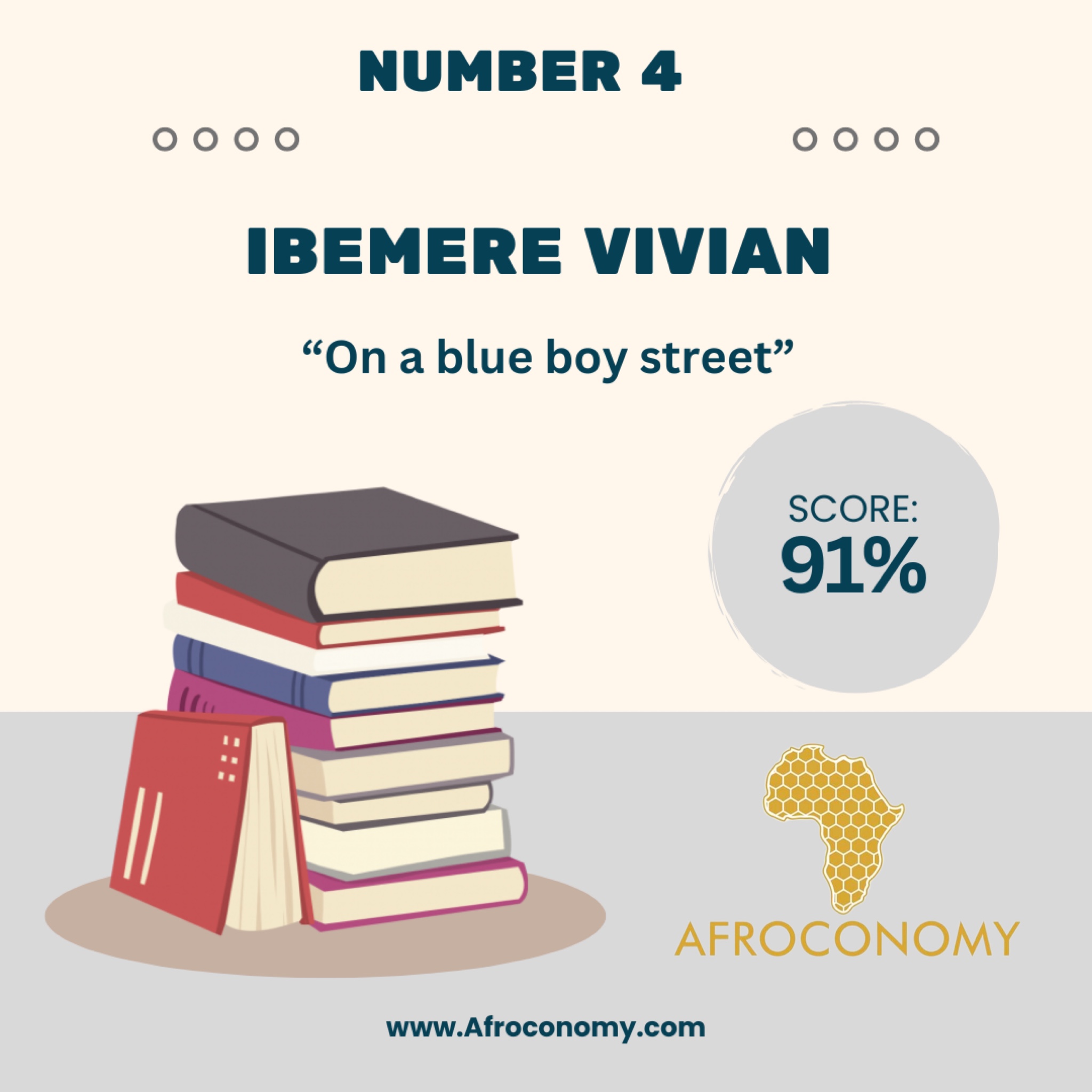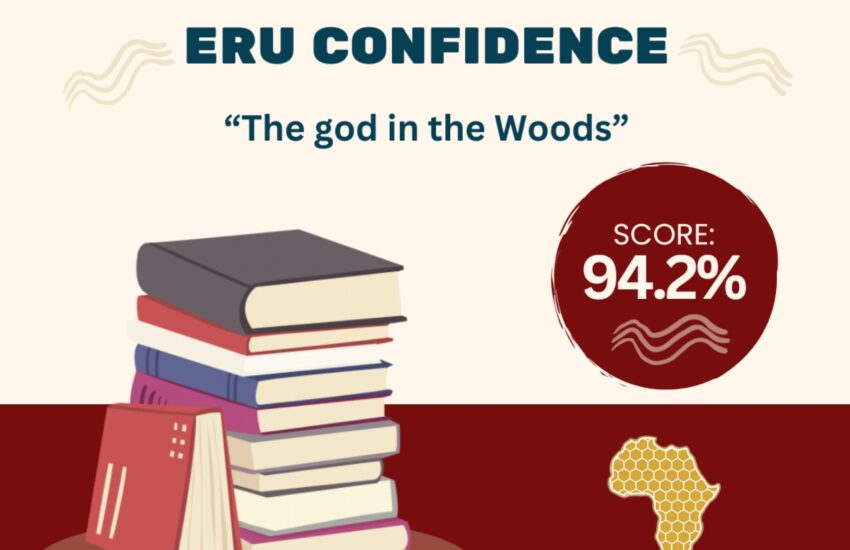On a Blue Boy Street
Part One (AGONY IN THE GARDEN)
The streets in their broken bits bubble up to the remote voices from the main roads, mind-numbing footfalls of workers waddling home from the day’s headache, plangent roar of generators from viewing centers and whizzing tires of motor vehicles—rip off my raptness and the October breeze in my stomach doesn’t help. Somehow, it is sucking and searing the crumbs of bread that I was fortunate to eat before being chased out to the prayer ground.
My growling stomach overweighs the prayerful wording of other children who don’t budge at the bites of the coarse sand on their bent knees as their fingertips shift from one lucent bead of the rosary to the next in ringing voices—enough to alarm passersby. I know the sorrowful mysteries which is being recited like the back of my dimpled fingers except the picture of the kibbled melon seeds mother was stirring in a pot of sizzling palm oil fills my bushed head and dizzily, my fingers miss count of the beads. Several times, I have been provoked to stand on my feet, rosary dangling on my neck and flee back home but for one solid reason my knees are still pinned to the ground. This is because of the cabin biscuits that will be shared at the end of the prayers to those who are steadfast.
On my own, I won’t be here under the thickening darkness of an ailing city still plastering the cracks which sunk innocent lives in a bomb blast last year. Many terrified parents even ban their children from going to the prayer ground. But mother’s cane—historic and harsh, and my sister’s tempting traps always draw me out to the little Block Rosary Crusade by the corner of our old, animated street.
“I will buy you dates and tiger-nuts if you come today,” she would bribe, stroking my curly hairs and my itchy throat would succumb without consulting the brain.
Meanwhile, mother would hang around the front porch, waggling her cane like Brown’s tail and daring me to stay at home if I wanted to go down memory lane.
Skunked by hunger, I spy the ray of light from two candle sticks on an aluminum altar—its blue spray scraped off by doggedness and dressed in a pearly cloth with the stamp of the Blessed Virgin Mary, perching breezily on the faces of praying minors in the wardship of three adults who are parading hawkishly to hunt down absent-minded children like me. Lips pressed, I listen to the orotund holler of the leaders at the mouth of the altar—two girls, their heads wrapped up in longish scarfs that reach the ground as if to sweep away foul spirits, one of them is my sister and in the middle is a boy, blessed amongst women.
“The first sorrowful mystery, the agony in the garden…,” the leaders introduce, reciting the content of the mystery in euphony.
Latterly, one of the girls calls, “Give your intentions.”
“With this decade let us pray for Plateau State, that God may grant her permanent peace. For this intention we pray,” the shrill voice of Nmesoma kneeling by my left side shakes off the slumber of my concentration as my weight collapses behind my calves. Overworked.
“Lord hear our prayers,” everyone responds in cacophony, the wind whirling heavenwards with their litanies, regardless. While I wait, not meekly, for the time to strike seven.
“The second sorrowful mystery….”
It is the boy’s turn to shout the command, “…intentions!”
I know the boy. Ifeanyi is his name. A parrot on the prayer ground but a dull bird outside here. Slothful on the football pitch—counting from one to twenty before coddling the ball with his skeleton leg. The boys on the street, even my close friend, Vincent can’t stand playing with him on any team. Vincent said that the boy has a hole in his heart but I don’t believe, he is too sunny to be sick. Too full-mouthed to be empty.
Now, thinking about my friend, I feel bored. If he were to be here, we would have poked fun at Nmesoma’s jutting teeth as she struggles to tuck them inside her mouth. Her hassle similizes the image of an obese child pulling hard to cover his portly tummy with a cropped polo. We would giggle like drunk gossips then drive to poke another bizarre human being. Most times we got lump-sprouting blows on our brainy coconut heads from the grown-ups or were told to lift our hands up and shut our prying eyes which never pegged our watery tongues.
The turmoil in town tossed Vincent and his family to Ibadan. Before they relocated in April, we swapped letters like lovebirds and cried wildly on each other’s shoulders like twins being separated. There are days I climb the rocks on the street to cherish floating memories of our boyhood together, flashing back to days our stubborn hands trammeled grasshopperswith deaf ears to the news of children who went missing in their chase for those tricky tiny brownish insects. Including the memory of a riot in town one very hot and humid Friday that found us holed up in an oppugnant cobbler’s zinced box only to discover late in the evening, still garbed in our school uniforms that it had been a false alarm by a lunatic who hotfooted street to street yowling, ‘Anfara… They have started’. On that spot, I cogitate on what it feels like to live in a city that sits pretty, unflappable at the blare of elephants. No bombs or bullets for rain. No black clouds gobbling up the sun.
Somto sings out her desire for all and sundry to hear, “With this decade of the rosary, we pray for those who suffer from mental illness everywhere on earth that God may help and console them. I recommend, Mike in particular. For this intention we pray.”
A smile still hanging on her lips, I catch some children stifling and swallowing the laugher in their gullets before venting a chorus, “Lord, hear our prayers.” And like a shot, they rattle off the Lord’s Prayer and the closing rogation.
Who prays for mad people, if not my sister? I jaw to myself as my right paw rashly pour the sign of the cross on my face, chest and shoulders. Flying up on my feet, I grab my prize for being faithful with a frown. The cabin biscuits have been left naked and turned out puffy and whiffy—scattering to flakes before they enter my mouth, and scenting like Joy soap.
My mother’s first child sees the scowl trailing behind me to the altar under the faint glimmer of the candles. “Take mine,” she tugs me close by the rift of my sweater and lavishes me with her rations which dirty the ground too.
I hold my hand open for her to see the scraps in the guise of biscuits left to eat.
“Don’t worry, I will keep my promise,” she says, picking and eating the bitty rosy flesh in the hub of her upper lip. That’s how I know she won’t eat her words.
Pocketing the rarely used vial of pepper spray given to her by mother to guard her budding chest from ‘touch and go’ boys, she tows me toward the rowdiest part of the street, “Come let’s escort Chioma, Mariam and Udo to their houses.”
A cheerful smile lifts my chiseled jaw not for the sake of her invitation. I dust the whits off on the not ever paling indigo jeans trousers that father bought on his trip back in February as I find my dog-tired self wandering the streets from one roof to the other, giving my sister a leg up with the burden of seeing off little children. It is forever knotty to say nay to my sister with her sort of eyes: glazed with benignancy—sacs of gold glittering throughout every season. Except for the smattering days they are chased into their sockets, dancing from gay to blue at the hand of her menses—something that presses my sister to sip chilled Locozade Boost Drink every minute to nurse the three-day throe which causes her creamy face to welter like a waterless flower. In no time, her smile bounces back to gladden weariest of souls. Mother calls her sunflower: bright, really bright not to be seen. The tinge of my delicate and hyaline skin is the opposite of hers, brown as tobacco leaves like mother’s own.
All the while, with all my might, I turn deaf ears to the rumble of famishment in my belly and swallow the urge to pull Somto’s curved peach lips from the myriad of pleasantries she entangles herself with the kids’ parents and is now exchanging with Mama Mariam, the onliest woman who fries Kosai and sells Kunu for the alloyed inhabitants on our alley.
“You na better pikin oh,” the charcoal skinned woman is showering compliments in pidgin as she collects her sleeping daughter from my sister’s broad shoulder.
It is crystal clear that Mama Mariam’s mulish hide is from the backwash of drudgery with hands slaved to nourish many mouths even that of a drunken husband. There is no morning the street don’t wake up to find his stinking body chilling inside gutters, hugging a bottle of goskolo and reeling off the names of his seven children as though he wished not to go blank. I always wag my head at the sorry sight, shoulders heaving proud because I know father will never stoop so low.
“Tell your mama make she no come late today again. I no get strength to dey narrate the side wey she miss.” We both bury our heads in the sand at her message for mother, at the same time trying to unravel the mystery behind their common interest as long as last month.
Downward, on the grubby lane home, away from the fueled electricity at the junction where people are clustered like birds at the chains of viewing centers, my mind begins to sail with eerie pictures of night. I hate the dark—one never knows what might be lurking in the shrubberies and trenches, waiting to spring up on you at the drop of your footsteps. It can be a rat, or a snake or worst Mike. At the thought of his name, I tightly screw the grip of my sister’s hand, fearful that her wrist might fracture.
“You are easily scared like a chicken,” she squibs and chuckles mildly akin to the whispers of the wind warbling in our ears.
“Mummy have warned you to stop going to people’s house after prayers, but you won’t listen,” I say to defend myself whereas it is true what mother said.
“Stop being a cry baby. It is not like our house is even far from the junction.” She doesn’t smile. However, she holds my hand like a gemstone, just in case.
And it comes to pass… a building away from our tracks, in front of the tranquility that Vincent’s former house bestows, my worst fear leans against the grayish fence in moth-eaten rags with feet enclosed in father’s shabby shoes. I stiffen at the specter of Mike, the mad man—although he poses as Parasite, gawking at us. Even without light, I see that his eyes are deep and misty, swimming in a stagnant pool of dismal on a rugged face. A perfect picture of emptiness, carbon copy of the house on whose wall he seeks saneness.
My heart skips many beats as stream of horrid sweats run down my sides, soaking my purple and pink and green ‘Barney and friends’ sweater with a vivid hindsight of the blow he landed on the spine of one of the new boys on our street. The boy cried for days. He said he had hailed him by his given name instead of his chosen name apace with pebbles. The horde of children learnt from his silly bungle.
A thrum of panic shoots through me when Somto exhorts me to move on. My pudgy legs start to wobble as they stride past Parasite. Slow and juddering. Whimpering like a thirteen year old kid whose body cannot curtail the madman’s heavy gaze, I let go and lope. Aside the beat of my chest, the thumping of my egg yolk colored slippers across houses drum at the back of my ears—their kpa kpa kpa drown my sister’s dull holler of my name. I can’t risk falling into his list of people whose brains he will have to reboot.
I gallop passed the prayer ground—now iced as a morgue, a bantam mechanic garage in the hand of a man in darkness, an oxblood painted three-storied building lived-in by Faridah’s tribe before halting in front of the red gate that father had mounted to fence us and our cream-coated three bedroom bungalow, especially when he is away on the highways. Still catching my breath, I cram varied tattle that I have heard about Parasite. Many say he read too much and books made him go whacko. Others say he was a drug addict in college who sniffed in more that he could carry and it knocked off his head. Some say that it was the spell cast on him at Yakubu Gowon Airport on a flight to one football academy in Lagos State, and few say he lost all his family members in a ghastly motor accident on the roads of Otukpo in Benue State, so their death broke him to terminal pieces. His carriage leaves me with no doubt whatsoever. I credit all the rumors, even those my ears have not caught wholeheartedly.
“As a man…,” I would tell my sister, “Mike, the mad man should pick himself up and stop whining like a baby.” She would split her sides, look down at me and shake her head without gabbing a word.
With the aid of the milky glow from the moon as if it is nearest to the earth, I get a glimpse of my sister, carrying the chubbiness in her legs the way mother said she should walk, with caution as though they are chewing sticks that are prone to break at any tempestuous tap towards the gate while I am panting like a goat on a bloody slab in an abattoir.
When she comes close, I pounce on her with questions. “Why did you give the mad man Daddy’s shoes?”
No one else in the house has generous hands like my sister, so I didn’t blink twice when I saw Parasite wearing father’s beige shoes. I used to put my undersized feet inside them and roam the house, pretending to be father, steering the round lid of a paint bucket with a mouth vibrating to the vroooom of my white phantasmic Peugeot 504.
“They are worn-out and smelly,” she blurts out, “…or you had plans of inheriting them?”
“Those ugly shoes?” I begin to feel stupid for asking. “I will still tell Daddy when he returns that you gave out his shoes to a mad man,” I stress the last two words to conceal the effect of her taunt.
Her tittering bursts into my head, driving away the gloominess of the man parading everywhere in father’s belongings. Her next words are enameled with bits of anger.
“It is not fair to run away from such people, Chu-chu,” she says in a splitting tone, tightening her jaw and still finds a way to squeeze in my pet name. I notice she is running away from mentioning the word, ‘mad’ as if that fact is not already an overt one.
I catch the breeze playing with her gown, giving it a ball shape—rounded and wide-mouthed but she doesn’t mind it or my smirk.
“It can happen to anyone.”
I catapult a hand over my head to rebuke totally, the gross words gushing out of her mouth. “So that he will bite rabies into my body,” I roll the ‘God forbid’ eyes at my sister and exhale, “…I still love my life. Thank you very much.”
“One day you’ll get tired of running… from him,” She pushes on, striking a nerve and making me look like a bad person for trying to be on a safer ground. I tell her I will never run out of breath racing from Parasite’s touch on my fresh skin.
Without saying anymore words, I jerk the gate ajar. Its rickety noise echoes the absence of the breadwinner in the house. Father would have oiled the hinges to heal its joints like he always does whenever I injured myself while playing on the street or at school.
“Do you want your body to be a map of scars, my boy?” he would ask, softly rubbing an ointment on my wound and cracking funny jokes about scaring girls away with the legion bruises on my body, if I don’t cut down my rough plays. Then, he would travel off on a long journey, return to oil our joints and go away again. He is not steady like the source of power on this street. Off and on. Most times no show for months.
The perfume of queen of the night hedges from outside drifts into the main house with us. Brown sniffles out our smell of camphor although mixed with dust and cabin biscuits, I see her waggling a welcome tail on the dim patio which fetches her silky trunk a warm snuggle. Inside the house, the parlor is not happy. Its creamy walls have not tasted the radiance of a light bulb in the last two weeks and the candle burning on the dining table is once again drawing spooky reflections on them. The brownness of the sofas is far from fulgid, they look like opened coffins painted pitch-black. I hate candles to boot. The uncanniness of candlelight is enough to make a person lose his mind, an exact eidolon hovering over Parasite—the one I will not tire scooting from. Mother had promised to buy kerosene on her way back from her stall today. At least I can manage a lantern. But the flame flickering on the candle stick tells me she forgot, same way our open day at school yesterday skipped her mind.
Standing in the middle of the parlor, close to a center table—monocolor like the rest, I am about to call out to mother when we bump into a pleasingly plump figure bundled up in fitted salmon polo and baggy jeans, the feet are in a pair of black flip-flop with a spatula in hand. My stomach begins to growl louder than before as the wooden thing falls on our heads one after the other. Kpom! Kpom! Knocking out the remainder memory of Mike, the mad man but I am pacified by the aroma from the kitchen while my sister is still rubbing her runny nose. That small beating!
“You two should have slept there. I was on my way to bring a mattress and blankets for your new room outside my house.” Mother frowns, her cheerless eyes silently warning us. “Look at the time! You spent close to an hour before coming home. What were you doing?”
“Mike was chasing us.”
“He didn’t chase anyone except in your big head.”
“That should have made your journey home faster.” Her angry white eyeballs are the only things I can see gyrating in its sockets. “You two won’t make me late for today’s episode.”
Somto’s face and mine drop with a glower. It is always lonely whenever she goes out to watch this soap opera that is stealing her spotlight from us every evening and turning her into a freak—she had even slapped Somto for resetting the clock, dragging blood out of my sister’s mouth with the ruby on her wedding ring.
Following the explosion of the transformer on the street two weeks ago and nobody lifting a hand to fiddle with it, mother has made visiting the viewing center at the junction a point of duty to be up-to-date with the Telemundo series, ‘When You’re Mine’. The melody with which she sings the love triangle story of Paloma and Diego is maddening and I plan to tell father when he comes home. Sometimes, I puzzle if it is her own way of saying she misses his company via tapping into a world absent from her reality.
On the brink of shouting, I weave my English words fastidiously as my cerebrum gives the consent to put forth kerosene in lieu of fossil fuel—thanks to the pile of newspapers I used to peruse time after time in Vincent’s house. Plus we almost never speak Igbo with mother, same doesn’t go with father.
“You didn’t buy the kerosene again.”
“Tomorrow. Except you want to give me money to buy some tonight,” she sasses. Her ears are growing tall to the ticktack of the clock above our boxed TV and her eyes don’t notice my chimera bleeding on the cold wall she bashed it.
She barges into the kitchen and out, hands weighing a tray of food. We scramble to the table after her like hungry cubs in pursuit of a lioness’s teeth chomping its capture. Our rumps plop down on the faded chairs behind the framed photograph of mother’s three children hanging on the wall. Mother’s hawkish eyes sit across the table, patrolling to repaint the face of any hasty mouth for meat from a plate still full of food with a thundery spank as our hands dive to work—cutting big white morsels of fufu, scooping up yellowish leafy Egusi soup and swallowing the viscous combo until the ball slumps down into our stomachs, a green light to mold further.
After patching things up with hungriness, I barter the lean chicken leg on my empty bowl which mother rejoice in broiling as my partage for the breast my sister is evermore favored to get. Our soupy hands meet under the table, a safe place for such bargain to boom and never have Somto pull back on any. She has a staunch relish for those spiky four claws but mother won’t just dump them in her plate. My sister’s nature to garnish small fry with ribbons of repute leaves me widemouthed no more, passel of times I fail to mutter gratitude.
“Daddy will come back today or tomorrow?” We both ask in whispering voices, more like a prayer than a question as our gazes rake her white powdered face for a response while flailing our wet hands, dry.
“I won’t miss tonight’s episode because of your questions.” The shoot back from her glossy mouth is sterner than the first time which cages our lily-livered tongues.
“There will be a lot to do tomorrow. The earlier you go to bed, the earlier you wake up to finish your chores.” I hear her teeth grinding and chewing on the words she just spit out.
I hate the name of the next day, it forever wears me out. After battling with housework, we are browbeaten to conquer the errands in mother’s stall. The hustle and bustle from customers hammering out deals, people gossiping in huddles, store owners hooting their giveaway prizes in Chobe Market where she sells foodstuffs at wholesale prices is so boisterous, fragile shoppers run the risk of staggering home stone deaf. We come back dead on our feet and smelling of sweat, crayfish, freshly slaughtered meats because mother’s neighbor is a butcher, and Okpeyi, the worst of all malodor.
“That is the smell of Saturday,” mother would grin.
At nine thirty, mother scuttles into the kitchen like a bride late for her big day to bolt the door leading to the backyard where that daunting slippery well is dug before twisting our necks to sleep. She inflames another candle for my sister’s room which is an inch away from mine and the formerly afire one for my room. There, I watch mother’s hastening hands gum the candle stick in its waxy vomit on one of the red and blue boxes of the rubbery Nigerian tiles, same way she did it yesterday and the day after and so on in the past weeks. Reciting her freakish pledge on the way out, ‘I will be back before dark,’ she padlocks the central door and the gate, confining her children to the callow arms of each other and Brown’s low barks now and then. And as usual in the absence of our fortress who is supposed to hide us from heavy storms and quench our fears in the absence of father, I beg my sister to babysit me in my room, to cover me from the scary night stare.
If there is electricity, the baby blue walls sullied by colorful crayon cartoons and cockeyed tittles of white chalk from height measurements will have been salient as the rooted scratch on my forehead. With the candle light burning, my room is a shrine of shadows. The clusters of my clothes and those of my younger brother in three chock-full bags, neatly tucked away in a corner by my sister’s hands are flouncing to the flame. Before, this room carried the snoring sounds of him and me while my only sister sleeps with mother whenever father is away.
Whilst the rest of the children on the street succumb to the call of night, Somto and I are on a silken mattress, wide-eyed like those of an owl and tracing the straying shadows on the ceiling into human figures. Her eyes pick a map with semblance to father. Throughout, all I see is Parasite with saliva at the mouth like a nutty dog and this spring up a green phobia for murkiness.
Somto stands up, reaches for the frilly curtains of the only window hindering coziness a smooth passage—it is odd because this time of the year is not hot, and draws it aside in one gentle swing. The gladdened room welcomes the soft strokes of breeze as it plays with the fire and wipes off the wetness on my pilose chocolate skin. Outside, the rustling of leaves on the guava tree adds to our sleeplessness, flipping through pages of father in our heads. They are few but memorable.
“I can’t wait for father to come back. He stayed too long this time around,” my sister breathes when she rejoins me on the bed, sadness dripping from every word and sending same ache over me.
As a dusk to dawn driver, father is always away from home to convey lives as safely as he can from one parlous road to the other while we wait patiently for his hands to come back to steer our own wheels. I want to pick father’s brain on some stuff—not mother or Somto, they will definitely not have an answer, but he keeps doing hide-and-seek.
I am struggling to say, “I miss him too,” just to comfort her but the words stick in my throat, as I magnet her to my bosom.
Soon, the warmth of silence snatches me from her dulcet voice into dreamland where I am basking in the purity of a garden full of white flowers. My hand is cupping and culling some. ‘For my sister,’ I snore, sniffling in the scented air down to my lungs. It smells like morning-glory, like mother. I allow my feet play on the trimmed green grass. It is soothing as if the tiny blades of grasses are straws sapping away my worries. A butterfly, white too, with no speckle, perches on the bridge of my nose, flapping endlessly. I recall when I used to flap my hands like one and mother would pick me up, whirling my smaller self until my laughter as well became dizzy.
This must be the corridor to heaven, I agree, crowning my head with a florid band ready to see my Creator. Beyond the garden, a gate up in smoke nabs my attention. Is that hellfire? I wonder, walking towards it, curiosity wrapping its arms strongly around me. About four steps away from the fiery gate, the butterfly flies away, and my feet starts to feel sore like they were thrown into a boiling pot of water. The bright cloud above my head is swallowed by a mauve colored one but I continue to walk, gritting my teeth in pain and grip with shock at the sudden shift in temperature.
A wall of fire starts to burst with speed against me, catches up with me and its torrid tongue licking my skin. My heartbeat is pounding hard in my ears at the ton of ache I am passing through. It feels like a heated hand is picking and peeling and pulling my flesh off, exposing a whiter layer dotted with blood. When I realize that the garden behind me is withering in flames, drifting from white to black—purity to agony, horror begins to spurt from my inside like the night I had watched the film, ‘Willy Willy’ and sleep abandoned me for weeks.
“Somebody, help me!” I hear my parched throat wail. Powerless to feel my limbs, I watch thick yellowish red smoke polish me off.
I wake from my dream to find out that the wildfire pursued me to my stuffy room. A trill of fear ripples through me as my teary eyes search for my sister. She isn’t here! The hissing sound of charring clothes and everything else sting my nose, choking me to breathe through my mouth. Inhaling fire and exhaling smoke, a spitting picture of a baby dragon. I feel like the hot strokes are melting my body and gradually, breathing becomes an uphill battle I will doubtlessly lose when a strong hand grabs me by my leg and lugs me out of the inferno, the touch just as hot.
“Where is Somto?”
Outside, the once gentle breeze sweeps through me as piercing as thorns, like the thorns on Jesus’ head in the third sorrowful mystery. In my unconsciousness, the discord of people trying to put out the fire fill my head.
“Where are their parents?”
“Who leaves children locked up in a candle lit room?”
“Some parents are the worst!”
“No! Please take the boy straight to the hospital.”
“Leave that one, he has nothing to lose…”
“Fire for dry season dey hard to quench.”
“The fire service in this country, never on time. Tufiakwa!”
“No need, nothing go remain for this house. Not even ashes.”
Then, I hear a familiar voice as I am being blanketed with a thick wrapper and wheeled away. It is weeping and blaming enemies for the flurry of fire. I am drifting to a dark place—dreadfully dark, my eyes are the only torch on the path, twitching to the drub of death as voices grow distant from my ears.
- Alkawari - January 9, 2023
- The god in the Woods - January 6, 2023
- Mandy’s Super Trio - January 4, 2023








